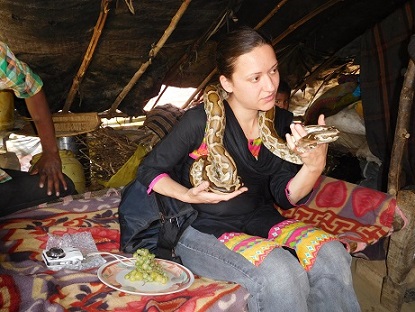Contact : diane.philiponet@yahoo.fr ; tel : + 33 7 83 44 67 09
Supervisor : Galia Valtchinova (LISST-CAS)
Co-supervisor : Daniela Berti (CNRS-Centre for Himalayan Studies)
Title of thesis : A study of human-animal relations in the urban space in North India. Monkey trainers at two Hindu pilgrimage centres on the Ganges : practices, representations and cosmology
The city, an anthropised territory par
 excellence, constitutes the habitat of a multitude of non-humans : deities, ghosts and legendary monsters, plant species, wild, endemic, commensal and domestic animal species. Non-human primates in Indian cities – a fortiori at Gangetic pilgrimage sites – interact with human populations as so-called : endemic pests, species linked to mythological heroes, pampered pets and commodities, or privileged delinquents under cover of the Wildlife Protection Act (1960) and prohibitions of Hindu worship. Coexisting with monkey species that have acclimatised to urban life has become a political and legal issue in India, and is a socio-cultural and religious resource for inhabitants, while posing intractable material problems and day-to-day management difficulties for the authorities and city dwellers. As such, ape trainers and specialists find themselves caught in the crossfire,
excellence, constitutes the habitat of a multitude of non-humans : deities, ghosts and legendary monsters, plant species, wild, endemic, commensal and domestic animal species. Non-human primates in Indian cities – a fortiori at Gangetic pilgrimage sites – interact with human populations as so-called : endemic pests, species linked to mythological heroes, pampered pets and commodities, or privileged delinquents under cover of the Wildlife Protection Act (1960) and prohibitions of Hindu worship. Coexisting with monkey species that have acclimatised to urban life has become a political and legal issue in India, and is a socio-cultural and religious resource for inhabitants, while posing intractable material problems and day-to-day management difficulties for the authorities and city dwellers. As such, ape trainers and specialists find themselves caught in the crossfire,
 on the one hand fulfilling functions that are indispensable for coexistence with these apes, and on the other falling under repressive legislation that alters and limits their areas of professional action. This study examines the special inclusion of monkeys and their specialists, trainers and masters, in the context of the Hindu pilgrimage site near the Ganges, through a field survey conducted in Varanasi and Rishikesh-Tapovân, within the legal and political context which, since the 2000s, has tended to further control and exclude these populations from the territory’s main urban centres.
on the one hand fulfilling functions that are indispensable for coexistence with these apes, and on the other falling under repressive legislation that alters and limits their areas of professional action. This study examines the special inclusion of monkeys and their specialists, trainers and masters, in the context of the Hindu pilgrimage site near the Ganges, through a field survey conducted in Varanasi and Rishikesh-Tapovân, within the legal and political context which, since the 2000s, has tended to further control and exclude these populations from the territory’s main urban centres.
Keywords :
– Hindu pilgrimage
– cult of Hanuman
– monkeys and mythology
– animal domestication/training
– animal policies
– urban wildlife/protected species
– undesirable populations/exclusion
– town and modernity
Research papers :
― 2015, ’Animalités croisées’ workshop, EHESS Marseille Frédéric Joulian, Pierre-Olivier Dittmar, EHESS, Marseille, ’Monkeys and humans along Ganga river, India’, 8 June.
― 2015, 5th Asie-Pacifique Réseau Asie et Pacifique Congress, Paris, ’Les divins nuisibles. Gestion gouvernementale des problèmes liés aux singes des villes en Inde du Nord’, 9 September.
― 2017, ’Taking Nature to the Courtroom’ workshop, Edinburgh, Anthony Good and Daniela Berti, University of Edinburgh, ’Divine nuisances. State management of problems linked to monkeys in North Indian cities’, 15 June.





